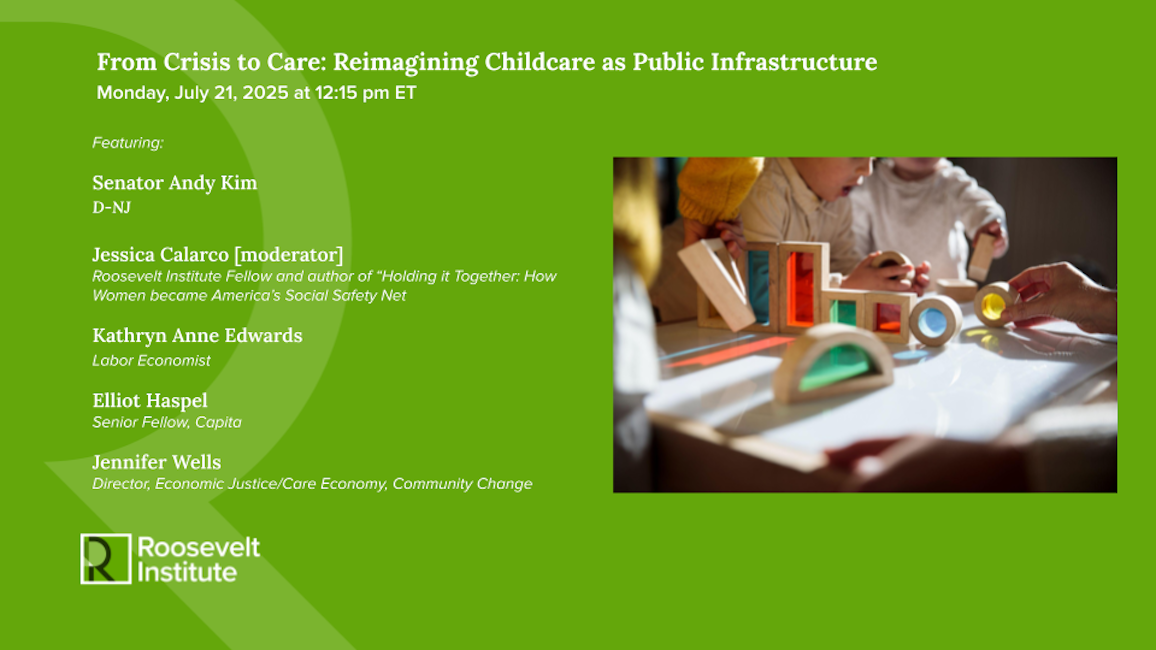Where Government AI Experiments Have Gone Wrong
July 18, 2025
Testing tech in the public sector carries major risks.
The Roosevelt Rundown features our top stories of the week.
(mediaphotos via Getty Images)
AI Can’t Improve Public Service Without Worker Voices
On a day-to-day basis, most Americans’ primary point of interaction with the government is with state and local public administrators. These are the workers who issue marriage licenses and construction permits, correspond with constituents about court appearances, and facilitate access to food assistance and unemployment benefits. In recent years, tech companies and policymakers have touted the potential of AI technologies to make workers more productive and improve customer service in the public sector.
But early results show that many AI tools have actually brought additional obstacles to public administration. In a new report, Roosevelt Fellow Samantha Shorey explores the ways in which AI is already used in these workplaces and how it’s impacting both government workers and the people who rely on them.
Existing use cases for AI in the public sector include public-facing chatbots that are programmed to answer questions about local laws, AI software that provides real-time captioning in different languages, and even systems that determine whether a person’s unemployment claim should be approved. While it may seem like automating these functions would make government services more efficient, there remains a need for human review of potential technological mistakes. “When workers have limited control over new technologies and their deployment, new kinds of errors and increased—rather than decreased—workloads emerge,” writes Shorey. On top of that, automation often results in increased administrative burden on constituents, such as having to fill out forms or do tasks that a worker would have helped with.
AI tools do have the potential to make workers’ lives easier—but figuring out how requires talking to workers so that they can shape the decisions.
“Without an understanding of what is at stake for government workers, what they need to effectively accomplish their tasks, and how hard they already work to provide crucial citizen services,” Shorey writes, “the deployment of AI technologies—sold as a solution in the public sector—will simply create new problems.”
Read the report: AI and Government Workers: Use Cases in Public Administration
What We’re Talking About
Childcare as Public Infrastructure
Childcare is a necessity. But for years, families have been forced to overpay, compromise, and make tough career decisions trying to navigate a system in crisis. On Monday, the Roosevelt Institute is bringing together the authors of three Roosevelt reports, along with Senator Andy Kim and sociologist Jessica Calarco, to discuss a path forward for childcare that puts American families and childcare workers—rather than large corporations—at the center of this essential service.
At a moment when providers are being forced to close, raise their rates, or sell to private equity firms, our panel imagines a society that guarantees affordable and quality childcare for all.
What We’re Reading
- On cuts to public media funding: The House passed a Trump plan to claw back funding for the Corporation for Public Broadcasting. Roosevelt’s Bilal Baydoun called the move part of “a broader effort by this administration to dismantle any institutions that might hold it accountable.”
- “While billionaire-owned platforms serve the interests of their owners and flood the public with misinformation,” Baydoun said in a statement, “congressional Republicans are cutting off a vital source of information that local and rural communities rely on.”
- On economic indicators: Inflation data released this week is starting to reflect Trump’s erratic economic policy, but the most extreme tariffs have not yet hit: “If you’re looking for those in the data, you probably aren’t going to find them,” Roosevelt Principal Economist Michael Madowitz told the New York Times.
- But once prices do rise more widely, companies might take advantage of the wiggle room to price gouge. “Once this dynamic actually kicks in, it could become self-reinforcing,” Roosevelt Fellow Isabella Weber told the Wall Street Journal.
- On the jobs front, Madowitz spoke with S&P Global about what rising teenage unemployment means for the broader economy.
- On how CEOs got so rich: Roosevelt Senior Fellow Lenore Palladino explained to More Perfect Union how companies are investing less and less of their profits into innovation and workforce development, and buying more and more shares of their own stock to artificially inflate their market value.
- On cryptocurrency: This week, the House passed industry-friendly legislation that Public Citizen is calling a surrender “to the onslaught of crypto political spending.”
- On taxes: Senior Fellow Darrick Hamilton spoke to NPR’s Planet Money about how taxes shape the economy—and the inequality in it—and reflect societal value.




